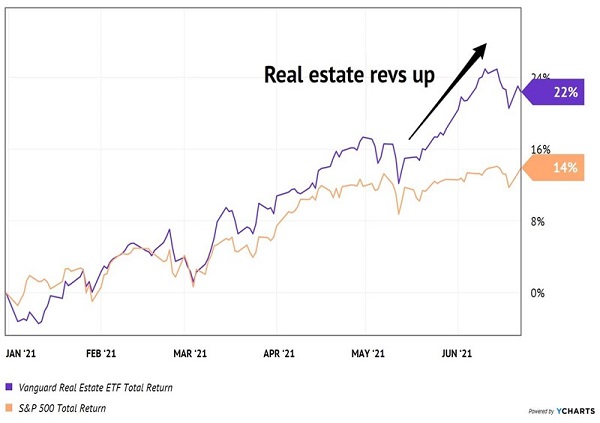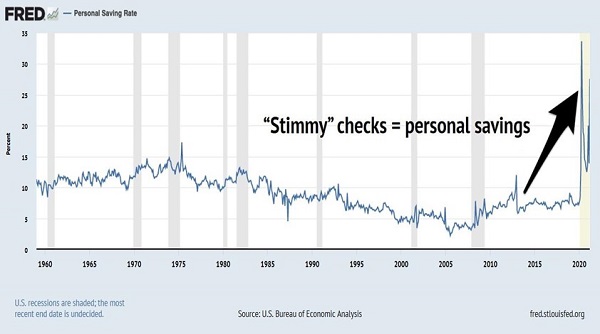Unlike the broader market, REITs (real estate investment trusts) haven’t been messing around this year. The Vanguard Real Estate ETF (NYSE:VNQ) has convincingly broken out to new highs.
For us dividend stock traders, the choice between the confident VNQ and tip-toeing S&P 500 has been an easy one. With short-term time frames, it’s usually best to ride the hot trend:
Money Cycles Towards REITs

REITs are on fire—the good kind, not 2020 dumpster variety—but they still have upside thanks to last year. Many perfectly good real estate stocks were tossed into the trash. These are high-quality landlords still trading on the cheap side as that 2020 stench slowly fades from their shares.
And don’t worry, we are not simply buying VNQ. We can do better by cherry picking the sector. VNQ yields just 2.1% today. It’s never paid less, which is the curse of all-time highs.
We can increase our payouts and inflation-proof them by carefully considering our real estate plays. Let’s discuss three REIT sectors that will benefit from the booming money supply.
1. Apartment REITs: Powered by Stimmy Checks
The current personal savings rate in the US is a sky-high 27.6%. Since checks started arriving in mailboxes a year ago, our average consumer has been sitting on a pile of cash.
Stimulus and Savings Go Together (Like a Horse and Carriage)

Some of the stimulus (“stimmy”) checks are being used to pay the rent. This is helpful for apartment REITs.
Location matters for these landlords. “The Donut Effect” is what economic researchers Arjun Ramani and Nicholas Bloom are labeling the emptying out of city centers. (Hat tip to Bloomberg for the story.) People are moving to the suburbs as well as smaller cities.
After all, why cram into a shoebox near the office if the office is not going to reopen?
Apartment Income REIT (NYSE:AIRC), for example, is feasting on this migration. AIRC owns a portfolio of 98 properties that total 26,599 apartment homes across big markets with high-paying jobs like Los Angeles, Philadelphia and Washington, D.C. The firm focuses on higher-end apartments that command above-market rents. Its average place leases for 17% more than a comparable unit down the street.
Higher-end apartments are the key here. These are the units with the spare bedroom that somebody can work from. They are in high demand as residents “donut” away from city centers.
AIRC yields a fat 4.9%, over 100% more than the Vanguard ETF!
2. Industrial REITs: Still at 2020 Prices
Industrial landlords boast strong cash flows. By renting to businesses and locking them into long-term leases, they are about as recession proof as we get.
Let’s take Contrarian Income Report favorite W P Carey (NYSE:WPC). Virtually all of its agreements include contractual rent increases for items such as inflation. And 62% of them are linked to the consumer price index (CPI).
During 2008, the firm’s occupancy rate held strong at an amazing 98.5%. It never dipped below 98.9% occupancy in virus-laced 2020. Incredible consistency!
WPC pays 5.5% today and raises its dividend quarterly, and those hikes may get a boost thanks to the higher CPI prints we are already seeing.
3. Mortgage REITs (mREITs): MSRs Required
Rising rates are going to put pressure on the fat yields paid by mortgage REITs. Higher rates mean fewer mortgage originations and lower profits. Plus, existing fixed-rate loans themselves decrease in value as rates go up.
No wonder some mREITs have begun to hedge for higher rates by loading up on mortgage service rights (MSRs). These are contracts that give the holder the right to collect payments from a borrower.
Now, these aren’t the loans themselves. They are the rights to service these loans. This is a subtle but important difference. MSRs tend to rise in value along with rates. They become more and more valuable in this environment as it becomes better to servicing existing loans than to originate new ones.
These are the types of nuances we must pay attention to protect our retirement portfolios from the 50-year inflation storm that is on the way.
Disclosure: Brett Owens and Michael Foster are contrarian income investors who look for undervalued stocks/funds across the U.S. markets. Click here to learn how to profit from their strategies in the latest report, "7 Great Dividend Growth Stocks for a Secure Retirement."
